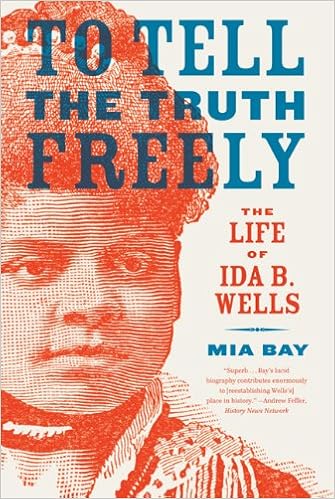To Tell the Truth Freely was published in 2009, a biography of a journalist and activist who died in 1931, and its applicability to modern-day politics is so acute that I tore through it at warp speed. Her political milieu is described as “a time when the Democrats were increasingly billing themselves as the party of white supremacy and the Republicans had largely abandoned any commitment to racial justice in favor of an alliance with big business.” I defy you not to shudder when you read that.

Though Wells’s biographer repeatedly emphasizes her subject’s temper (and intemperance), it’s clear that Ida B. Wells had a right to be angry. When she left organizations, it was in protest of accommodationist tactics that prioritized white comfort over black lives — a tendency that obtains to this day. Wells was born in slavery in Mississippi to parents and fought hard to become a journalist at a time when black voices, and black women’s voices in particular, were being silenced around the nation. She never gave up. She just never did, not until the day she died. The one time Bay talks about her considering leaving a fight for someone else, her thirteen-year-old boy says to her, “Mother, if you don’t go, nobody else will.” So she went. She never gave up.
As a young journalist, Wells was nervous to push back against lynching with all of her strength and eloquence, because she believed the narrative that lynchings were committed against rapists. But when a lynching took place in her own town of Memphis, she began to investigate these crimes more closely, and she realized that she had been deceived. Two-thirds of lynching victims had never even been accused of rape, and many more were accused of rape after the fact, to justify their murders by angry white mobs.
She dedicated the rest of her life to fighting against lynching, in the teeth of white supremacy, violence, and respectability politics. She was the first black woman to own a newspaper, and her newspaper was burned and destroyed, and she just moved to Chicago and started again. When American audiences proved unreceptive, she got letters of recommendation from my dude Frederick Douglass and took her show on the road in England, ginning up international pressure on US lawmakers to prevent mob justice in their jurisdictions. Once, after a major publicity effort around one lynching, she received a telegram from Memphis, from a white supremacist fuck trying to fuck with her, that said a black man would soon be lynched in Memphis, and asked her to come to Memphis to write it up. The actual naked cruelty of that act stunned me, and I live on fucking Twitter.
If Wells failed to play well with others — which I do not concede, although this book kinda did, although it was written in a calmer and gentler time — it’s certainly true that she was faced with unbelievable provocation. She was penalized at every turn for her race, her gender, her class background, and her unwillingness to shut up about injustice. When she criticized leaders of the WCTU for failing to condemn lynchings, leadership on both sides of the Atlantic took her to task for her tone, insisted that white women lived in constant fear of being raped by black men, and passed a resolution that blanket-condemned “lawlessness” but also condemned “the unspeakable outrages which have so often provoked such lawlessness.” Read this book if you want to hate white women. I wanted to go back in time and kick Frances Willard in the shins.
I also lived in dread, as you do when reading biographies of women, of what was going to happen with Ida’s romantic life. She was flirty and social as a young woman, but deeply ambivalent about getting married and starting a family, and I kept thinking that she was going to do like frankly most women in all of history and end up married to someone who seemed nice at first but was a controlling dickbag in the end. Not so! She married a lawyer named Frederick Barnett who sounds like an absolute doll by any standards. Not only did he adorably court her by sending love letters to every train station where her cross-country train stopped (shut up, I can’t, that’s too sweet, I can’t), but he was a lifelong partner and staunch supporter of her writing and activism. When she began a social support agency for newly arrived poor black Chicagoans, he offered pro bono legal services to any members who found themselves in trouble with the law. Barnett also prioritized hiring household help to cook and clean for their family, so that Ida would be free to continue her work. She took his name when they married, but hyphenated, Ida B. Wells-Barnett, and she is my hero and I would die for her. I never want to find out anything to her husband’s discredit.
As you can see, I am in a glass case of emotion. Please read To Tell the Truth Freely, it is very good, and I want you to love Ida B. Wells as much as I do. You may assume that you already love her at the maximum setting (which is what I believed before reading this book), but reading this book will reveal to you that your sensors require recalibration and that actually there is much more love that you can feel for this woman, a true national heroine. Let’s put her on the money too. I would die for her.